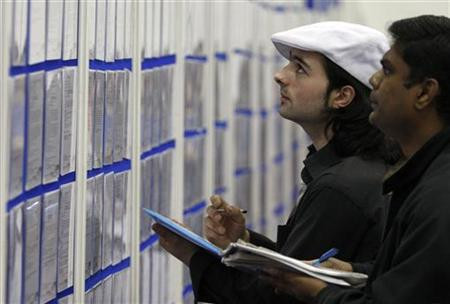UK job vacancies hit 12-month high but advertised wages fall in November, Adzuna says
Retail was the most affected with salaries down 17.4% on-year to £21,769.

Advertised job vacancies in the UK touched a 12-month high of 1,165,052 in November. While this was 0.2% more than October, it was down 6.4% when compared to November 2015, according to the latest jobs market report by Adzuna, a job search engine based in the UK.
The increase in vacancies had resulted in competition for jobs reaching an all-time low, with the average jobseeker per vacancy standing at 0.43 in November. Region-wise, Cambridge was revealed to have the least competition, with 10 vacancies for every jobseeker. On the other hand, Sunderland was found to be the toughest place to find a job, with 3.48 jobseekers for every job advertised.
The report also revealed that average advertised salaries declined despite the increase in vacancies. It was down 2.7% on-year to £32,200 ($39,773.42). This was also down 1.5% when compared to October's average salary of £32,725.
Sector-wise, retail was the most affected, which saw an on-year drop of 17.4% to £21,769. The Adzuna report said this was partly amid the increase in low-paid temporary jobs. Other sectors that were badly affected were consultancy, customer service and warehouse jobs, which saw average salaries drop 16.4%, 11.3% and 10.3% respectively.
Commenting on the report, Doug Monro, co-founder at Adzuna, said, "The jobs market has fared well in the main this year, given the unexpected events within the political climate.
"Despite total advertised vacancies increasing significantly, it may be too early to brand the jobs market a complete success given salary stagnation and the unpredictability that may lie ahead in the new year."
This comes just days after an Institute of Public Policy Research (IPPR) report said that the UK will face a volatile jobs market in the 2020s amid Brexit uncertainty. The report forecast two million jobs in retail and 600,000 in manufacturing to disappear by 2030.
Monro too gave his views on the Brexit uncertainty and its impact on the jobs market. He was quoted by the Guardian as saying, "2017 will certainly bring new prospects and challenges for the jobs market and the sooner Brexit plans are confirmed, the sooner businesses and individuals will be able to plan for the future with more certainty".
© Copyright IBTimes 2025. All rights reserved.





















